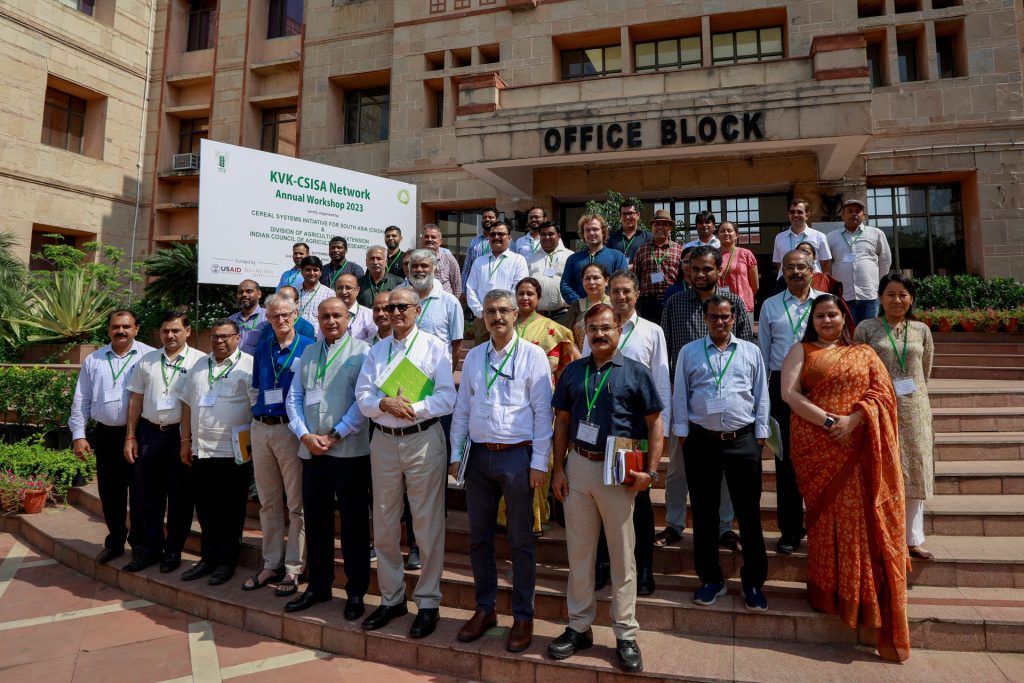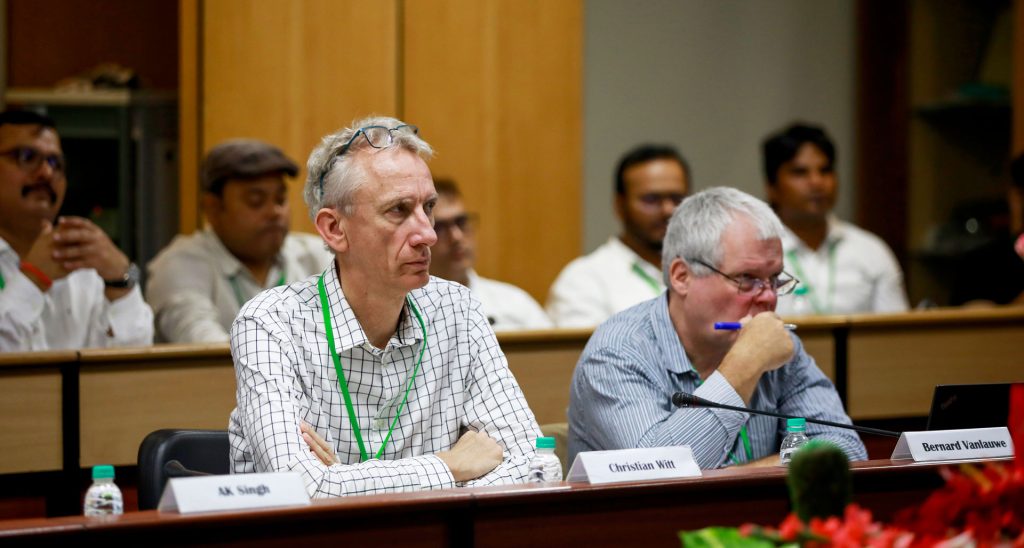KVK-CSISA Network Annual Workshop 2023
The Cereal Systems Initiative for South Asia (CSISA) and ICAR’s Krishi Vigyan Kendra (KVK) hosted their annual network meeting on 27 September 2023. The one-day CSISA-ICAR led meeting organized at NAAS complex, New Delhi, focused on the fourteen years of collaboration and milestones achieved while discussing new opportunities for strengthening the CSISA-KVK (ICAR) partnership to transform agriculture extension research and services. Further, speakers from ICAR and CSISA apprised participants of progress made on ongoing important initiatives and informed participants about new endeavors within the CSISA-KVK collaboration.
The annual meeting to review and discuss collaboration saw the participation of twenty officials representing the Indian Council of Agricultural Research (ICAR) and the Department of Agricultural Research and Education (DARE) – KVK, ATARI, IASRI – and the Department of Agriculture and Farmers Welfare (DA&FW), including over twenty-five CSISA colleagues.
CGIAR’s Excellence in Agronomy (EiA) lead, Dr. Bernard Vanlauwe, and Dr. Christian Witt from the Gates Foundation, including CIMMYT Asia representative Dr. Arun K Joshi attended the meeting to recognize and support efforts of CSISA-KVK (ICAR) partnership in transforming agriculture extension research and services.
The CSISA-ICAR led meeting, while focusing on the fourteen years of collaboration and milestones achieved, served as an interface of the grassroots and central-level extension systems and their successful collaboration with projects like CSISA. Participants discussed current initiatives, challenges, and opportunities to strengthen research and deliverables under agri-extension services.
Dr. R.K Malik, CSISA India Coordinator, opened the meeting with his welcome remarks and stressed the importance of this gathering, saying, “This is not a one-year review but the appraisal of fourteen years of collaboration and milestones”. He reiterated the impact of CSISA-KVK collaboration in helping transform agri-extension research and services in the country.
Key highlights and discussions from the meeting:
- CSISA India Lead Dr. Peter Craufurd presented on the fourteen years of collaboration with Krishi Vigyan Kendra.
- Dr. Craufurd said, “In 2009, the collaboration focused on new science and technologies to accelerate cereal production and establish research for evidence. The current focus is on “transforming how agronomic research and extension are implemented and mainstreamed into decision-making and policy processes”. He elaborated on recent initiatives and expectations from CSISA-KVK and how CSISA can add value going forward, considering the challenges and opportunities arising from climate change adaptation, digital agriculture and evidence generation for policy interventions. “Apart from research, our collaboration has been incredible for generating credible evidence, big data, for policy interventions”, added Dr. Craufurd.
- With a presentation on Analytics & Dashboard for Landscape Diagnostic Survey (LDS)/Landscape Crop Assessment Survey (LCAS) Data, Dr. Rajender Parsad, Director, IASRI, while acknowledging the role of scientist/researchers, stressed the importance of statistics and big data management in implementing and targeting agronomic practices. He also gave a detailed overview of the LDS dashboard, hosted by IASRI as a one-stop-shop for different data on agriculture extension.
- The Agricultural education system is dynamic and changing rapidly, and training students in new skills and technologies is critical. On implementing the LDS/LCAS survey through the State Agriculture University’s (SAUs) RAWE program, Dr. Jeet Ram Sharma, Director of Research at CCS Haryana Agriculture University (CCS HAU), expressed great satisfaction with the results and appreciated CSISA’s support for leading the collaboration with KVKs.
- Dr. Virender Kumar from CSISA shared an overview of the RAWE program and how CSISA and KVK implemented a pilot project with SAUs to help generate data through students’ participation while building their capacity in emerging science and big data management. On the importance of such collaborations with SAU, he said, “This one-month LCAS program under RAWE will lead to a regular flow of data covering larger geographies on an annual basis. If successful and institutionalized across SAUs (around 70) in the country, the issue of regular data flow (state specific/crop specific data stack) can be resolved”. Participants felt such data generation is advantageous and will provide better insights into policy formulation.
- Presenting an overview of the ongoing Pulses LDS/LCAS, Dr. R. Roy Burman ADG (AE) shared key insights from the first phase of the Pulses survey from Haryana and Uttar Pradesh. Through a detailed appraisal of farmers’ current practices viz growing or not growing pulses, he explained policy interventions and incentives needed to re-establish pulses cultivation, considering it as a critical crop for diversification and nutrition security. He informed about integrating the feedback mechanism through the convergence platforms at the state level and the MEL cell being established at the centre level – (with plans to establish one each in the eleven ATARIs) – division to support evidence-based policy interventions. He further said that Division of Agricultural Extension, ICAR and participating ATARIs could convince the Research Advisory Committee (RAC) to consent to introducing LDS as part of a regular process in the KVK system.
- On the increasing expectation of scaling LDS/LCAS across cropping practices and state, Dr. Shantanu Kumar Dubey, Director (ATARI-Kanpur), shared challenges and opportunities to lead this through ATARI-KVKs. “We began with CSISA taking the technical lead in the earlier LDS/LCAS surveys. With Pulses, it has been primarily ATARI-KVKs leading with CSISA support, so the transition has been encouraging. That said, we need to develop a pool of skilled trainers and master trainers for scaling it across cropping systems and regions”. CSISA could, with IASRI, think of an action plan regarding this.
- On creating digital public infrastructure for agriculture (farmer-centric), Mr Prakash Jayaram, Partner at EY (Ernst and Young) on behalf of DA&FW, presented an outline of the Agri-data stack initiative of the Ministry of Agriculture and Farmers Welfare. Agri-stack aims to create an ecosystem of various service providers targeting services to farmers and will develop digital registries that help identify, reach, and implement various farmer and agriculture-focused benefit schemes. Participants noted the scope for integrating these schemes based on evidence generated by CSISA-KVK through LDS/LCAS to support targeted interventions for individual farmers.
- In his keynote address, the Chief Guest of the meeting, Prof. A.K. Singh, Vice-Chancellor-Rani Lakshmi Bai Central Agricultural University, Jhansi and former DDG (Agri. Extension), reflected on the CSISA-KVK collaboration on prioritizing extension research to bring a system change in agri-extension services. “LDS in 2016 was a big step, a critical change in the system, toward generating evidence – comprehensive data collected through randomized selection – to guide policy decisions”. He mentioned that CSISA was the catalyst that helped facilitate these changes over the years. Prof. A.K. Singh informed participants that the adoption of MEL in the five-year plan of ICAR-KVK had been prioritized by all units under Agri-Extension.
- He also explained the role and expertise of each unit, like IASRI, to collate and analyze the findings of LDS. He stressed the role of CSISA as the catalyst in the MEL cell system that helps generate feedback loops as part of research. Prof. A.K. Singh elaborated on the expectations of such process change and how different streams within ICAR, SAUs, and RAWE programs can be integrated. The usefulness of intervention on “time management” has now motivated partners to expand such activities that help transform cropping system intensification across states and within states, he said.
- The role of other stakeholders and partners like CSISA to facilitate meeting these expectations through their expertise in research, capacity building, network, et al., was also discussed.
In closing the meeting, Dr. R. K. Singh, ADG (AE), in his vote of thanks address, expressed appreciation to the organizers for ensuring the participation of key individuals and departments to ensure a successful discussion. Thanking everyone for their participation, especially the speakers for their presentation, he thanked ICAR-KVK and CSISA leadership for sustaining this collaboration successfully and giving important direction for Indian agriculture extension.



